Politics in North Macedonia occur within the framework of a parliamentary representative democratic republic, whereby the Prime Minister is the head of government, and of a multi-party system. Executive power is exercised by the government. Legislative power is vested in both the government and parliament. The Judiciary is independent of the executive and the legislature. The Economist Intelligence Unit rated North Macedonia a "flawed democracy" in 2022.

The Internal Macedonian Revolutionary Organization – Democratic Party for Macedonian National Unity, abbreviated as VMRO-DPMNE, is a conservative and the main centre-right to right-wing political party in North Macedonia.

The Social Democratic Union of Macedonia is a social democratic political party, and the main centre-left party in North Macedonia. The party is pro-European.

The Democratic Union for Integration is the largest ethnic Albanian political party in North Macedonia and the third largest political party in the country. It was formed immediately after the country's 2001 armed conflict between the National Liberation Army and Macedonian security forces. NLA founder Ali Ahmeti has been the party's president ever since.
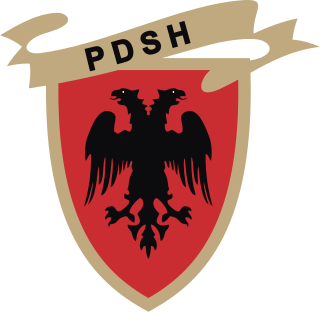
The Democratic Party of Albanians or DPA is a political party of ethnic Albanians in North Macedonia. The DPA is a merger of the Party for Democratic Prosperity of Albanians (PDPA) and the People's Democratic Party (NDP) which took place in June 1997. The former party was established in 1994 after some radical members of the Party for Democratic Prosperity, led by Menduh Thaçi and Arbën Xhaferi, left the PDP and the latter party was founded in August 1990 as a more radical opponent of the PDP.
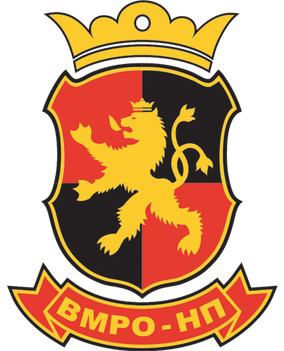
The Internal Macedonian Revolutionary Organization – People's Party, shortened as VMRO – People's Party and VMRO–NP, is a national-conservative political party in North Macedonia, founded by the former Prime Minister Ljubčo Georgievski, who split from the VMRO–DPMNE. The VMRO–NP was founded in Skopje on 4 July 2004. Vesna Janevska was elected as the party's first chairwoman. It is among the smaller parties of the country.
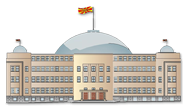
The Assembly of the Republic of North Macedonia, Sobranie, or Kuvendi is the unicameral legislature of North Macedonia. According to the Constitution, the Sobranie represents the people and is vested with legislative power. It can have between 120 and 140 MPs, elected by proportional representation from 6 electoral districts, each contributing 20 MPs, and there are also 3 reserved seats elected from the Macedonian diaspora which are awarded only if the voter turnout was sufficient. MPs are elected for a term of four years and cannot be recalled during their term. The Sobranie is presided over by a President. Its organization and functioning are regulated by the Constitution and Rules of Procedure. The Assembly's seat is in the Sobranie Palace in country's capital Skopje.

Parliamentary elections were held in Macedonia on 5 July 2006. The VMRO-DPMNE-led coalition emerged as the largest group in the Assembly, winning 45 of the 120 seats. Its leader Nikola Gruevski became Prime Minister after forming a coalition government with the Democratic Party of Albanians, New Social Democratic Party, Democratic Renewal and the Party for a European Future.
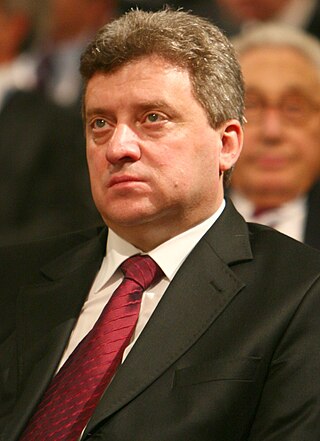
Presidential elections were held in Macedonia in 2009. The first round was held on 22 March, alongside local elections. As no candidate received more than 50% of the vote, a run-off round was held on 5 April 2009, which was won by Gjorge Ivanov of the center-right VMRO-DPMNE party. Incumbent President Branko Crvenkovski did not stand for re-election.

The Liberal Democratic Party is a social-liberal political party in North Macedonia. The Liberal Democratic Party was launched in April 1997 as a merger between the Liberal Party and the Democratic Party. The first leader of the party was Petar Goshev from the Democrats, who was also the last president of the League of Communists of Macedonia. When the Liberal Party was re-established in 1999, a significant portion of the former Liberal Party remained in LDP.
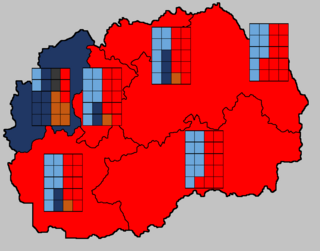
Early parliamentary elections were held in the Republic of Macedonia on 5 June 2011, a year earlier than necessary. All 123 parliamentary seats of the Sobranie were due for election, including the 3 seats provided for the first time for representatives of the Macedonian citizens living abroad: 1 from Europe, 1 from North America, and 1 from Asia and Australia. The decision of the ruling parties, the Christian Democratic VMRO-DPMNE and the ethnic Albanian Democratic Union for Integration (DUI), to dissolve the Parliament and call for an early election was preceded by protests of the Social Democratic Union (SDSM), the major opposition party, and subsequent boycott of the Parliament by them, and by other smaller opposition parties.

Skanderbeg Square is a square in Skopje, North Macedonia.

The sixth local elections for the election of local mayors of the municipalities of the Republic of Macedonia and members of municipality councils were held on schedule in 2013. There were two large coalitions on the elections: the Coalition for a Better Macedonia led by VMRO-DPMNE and the Union for the Future led by SDSM. Also present on the elections was the Democratic Union for Integration (DUI), Democratic Party of Albanians (DPA) and the Union of Roma Forces. There was also coalition made between the two major rival parties VMRO-DPMNE and SDSM in Kičevo and Struga municipalities against the ethnic Albanian candidates Fatmir Dehari and Ramiz Merko of DUI. There were two rounds in the elections on March 24, 2013 and April 7, 2013. The first round of elections were declared the most peaceful elections in the history of independent Macedonia without any serious incidents. The elections were however not untainted, as the situation in the Centar Municipality was labeled as undemocratic by the Macedonian opposition with several voters being labeled as questionable for having only recently received their national ID cards and not being actual inhabitants of this respective municipality. The elections in this municipality lasted for three turns and were monitored by the foreign embassies.

General elections[a] were held in the Republic of Macedonia in April 2014 to elect the President and members of parliament. The first round of the presidential elections were held on 13 April, with incumbent president Gjorge Ivanov finishing first with 53% of the vote. However, as he did not receive the support of 50% of all registered voters, a second round was held on 27 April, alongside parliamentary elections, with Ivanov and the ruling coalition led by VMRO-DPMNE claiming victory as Ivanov was elected president and the VMRO-DPMNE won 61 of the 123 seats in the Assembly.

The Party for the Full Emancipation of the Roma of Macedonia is a political party in North Macedonia representing the Roma minority.

Early parliamentary elections were held in Macedonia on 11 December 2016, having originally been planned for 24 April and later 5 June.
Storming of the Macedonian Parliament, also known as Bloody Thursday occurred on 27 April 2017, when about 200 Macedonian nationalists stormed the Macedonian Parliament in reaction to the election of Talat Xhaferi, an ethnic Albanian, as Speaker of the Assembly of the Republic of Macedonia. It was the biggest attack in history on a Macedonian institution.

Early parliamentary elections were held in North Macedonia on 15 July 2020. It was originally scheduled for November 2020, but Prime Minister Zoran Zaev called early elections after the European Council failed to come to an agreement on starting talks with North Macedonia on joining the European Union in October 2019. The election date was set for 12 April, but was postponed until July due to the COVID-19 pandemic in North Macedonia.

Parliamentary elections were held in North Macedonia on 8 May 2024. The slow pace of EU integration and corruption were the main issues during the campaign.














